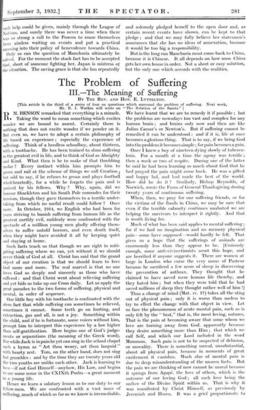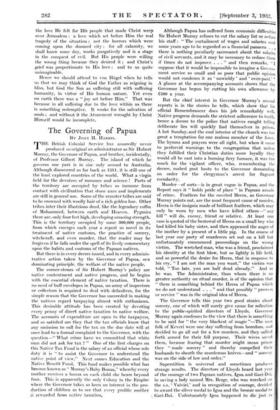The Problem of Suffering
III.—The Meaning of Suffering BY THE REV. AND HON. E. LYTTELTON.
[This article is the third of a series of four on questions which surround the problem of suffering. Next week, Mr. E. I. Watkin will write on " The Solution of the Saints." j
Such facts teach us that though we are right in miti- gating suffering where we can, yet without it we should never think of God at all. Christ has said that the grand object of our creation is that we should learn to love God more and more. The real marvel is that no one loves God so deeply and sincerely as those who have suffered : and that Christ went about relieving suffering and yet bids us take up our Cross daily. Let us apply the great paradox to the two forms of suffering, physical and mental, in order of sequence.
Our little boy with his toothache is confronted with the stern fact that while suffering can sometimes be relieved, sometimes it cannot. Some teeth go on hurting, and extraction, gas and all, is not a joy. Something within the child, and if he is fortunate, some voices without him, Prompt him-to interpret this experience by a law higher than self-gratification. Here begins one of God'g judge- ments or separations (the meaning of the Greek word). For while Jack is in pain he yet can sing in the school chapel such a hymn as " Art thou weary, art thou languid " with hearty zest. Tom, on the other hand, does not sing but grumbles : and by the time they are twenty years old the two youths are unlike each other. Jack is learning to love—if not God Himself—anyhow, His Law, and begins to see some sense in the CXIXth Psalm—a great moment in a young life.
Hence we learn a salutary lesson as to our duty to our fellow-men. We are confronted with a vast mass of suffering, much of which as far as we know is irremediable. RM. BENSON remarked that everything is a miracle. We have learnt that we are to remedy it if possible ; but e Taking the word to mean something which excites wonder we are bound to assent. Certainly there is nothing that does not excite wonder if we ponder on it. But even so, we have to adopt a certain philosophy of life based on experience ; especially the experience of suffering. Think of a heedless schoolboy, about thirteen, with a toothache. He has been trained to shun suffering as the greatest evil in life, and to think of God as Almighty and Kind. What then is he to make of that throbbing molar ? Every instinct within him prompts him to groan and rail at the scheme of things we call Creation . but odd to say, if he refuses to groan and plays football wholeheartedly, for a while he forgets the pain and is praised by his fellows. Why ? Why, again, did we honour Shackleton and his South Pole comrades for their heroism, though they gave themselves to a terrific under- taking from which no useful result could follow ? Once more. In October, 1914, we English who had been for years striving to banish suffering from human life as the greatest earthly evil, suddenly were confronted with the spectacle of a milllion young men gladly offering them- selves to suffer untold horrors, and even death itself, when they might have avoided it all by keeping quiet and staying at home. the problems are nowadays too vast and complex for any human brain ; and brains only now and then are like Julius Caesar's or Newton's. But if suffering cannot be remedied it can be understood : and if it is, life at once becomes a glorious thing. That is to say, if we bring God. into the problem it becomes simple ; for pain becomes a gain.
Once I knew a boy of nineteen dying slowly of tubercu- losis. For a month at a time the agony was terrific ; then a week or two of respite. During one of the latter he said he had been learning so much about God that he had prayed the pain might come back. He was a gifted and happy lad, and had made the best of the world. How did he do it ? Similarly, Bishop Reynolds, of Norwich, wrote the Form of General Thanksgiving during twenty years of continuous suffering.
When, then, we pray for our suffering friends, or for the victims of the floods in China, we may be sure that even if the terrible calamity continues *unabated we arc helping the survivors to interpret it rightly. And that is worth living for.
Much of what has been said applies to mental suffering ; for if we had no imagination and no memory physical pain—some have supposed—would hardly be felt. That gives us a hope that the sufferings of animals are enormously less than they appear to be. [Curiously enough, some anti-vivisectionists scout this hope, and are horrified if anyone suggests it. There arc women at large in London who curse the very name of Pasteur because he sacrificed a few score of sheep in discovering the prevention of anthrax. They thought that he claimed to have saved mere human life thereby, and they hated him ; but when they were told that he had saved millions of sheep they thought rather well of him !] Thus a change of mind (Mat. iv. 17) takes all the sting out of physical pain ; only it is worse than useless to try to effect the change with that object in view. Let us face the phenomenon of acute mental pain, such as is only felt by the " best," that is, the most loving, natures. That is the pain at becoming aware that some whom we love are turning away from God, apparently because they desire something more than Him ; that which we call Self, and which our Lord included in the word Mammon. Such pain is not to be suspected of delusion, or unreality. There is something unreal, unsubstantial, about all physical pain, because in moments of great excitement it vanishes. Much also of mental pain is due to deep misunderstanding of the unseen facts. But the pain we are thinking of now cannot be unreal because it springs from Agape, the love of others, which is the outcome of our loving God ; all such love being the onflow of the Divine Spirit within us. That is why it was manifested by Christ Himself, as previously by Jeremiah and Hosea. It was a grief proportionate to the love He felt for His people that made Christ weep over Jerusalem : a love which set before Him the real tragedy of the situation ; not the horrors which were coming upon the doomed city : for all calamity, we shall know some day, works purgatively and is a stage in the conquest of evil. But His people were willing the wrong thing because they desired it ; and Christ's grief was proportionate to His love : and to us quite unimaginable.
Hence we should attend to von Hugel when he, tells us that we may think of God the Father as reigning in bliss, but God the Son as suffering still with suffering humanity, in virtue of His human nature. Yet even on earth there was a " joy set before Him." That was because in all suffering due to the love within us there is something redemptive. It works for the salvation of souls ; and without it the Atonement wrought by Christ Himself would be incomplete,































 Previous page
Previous page